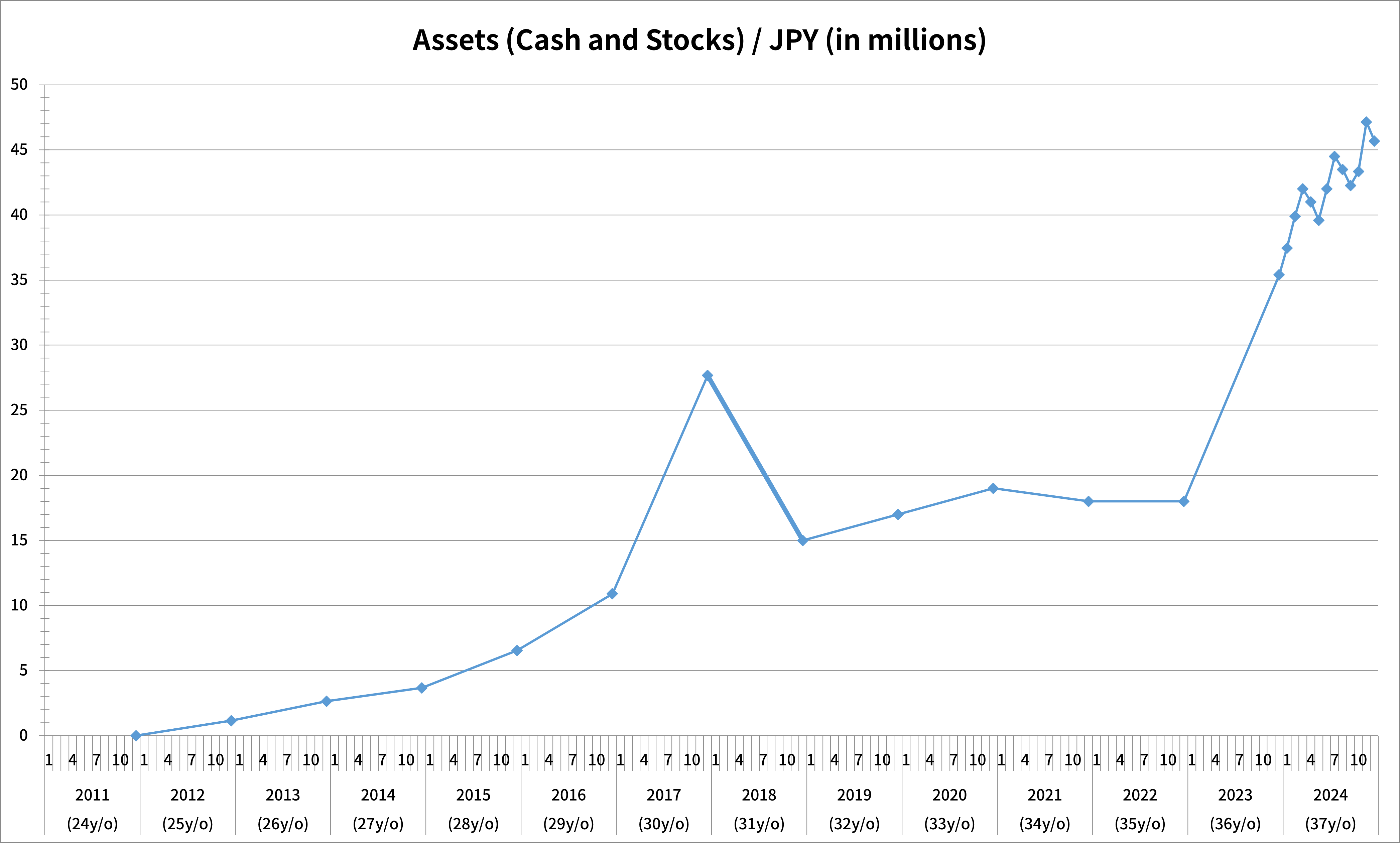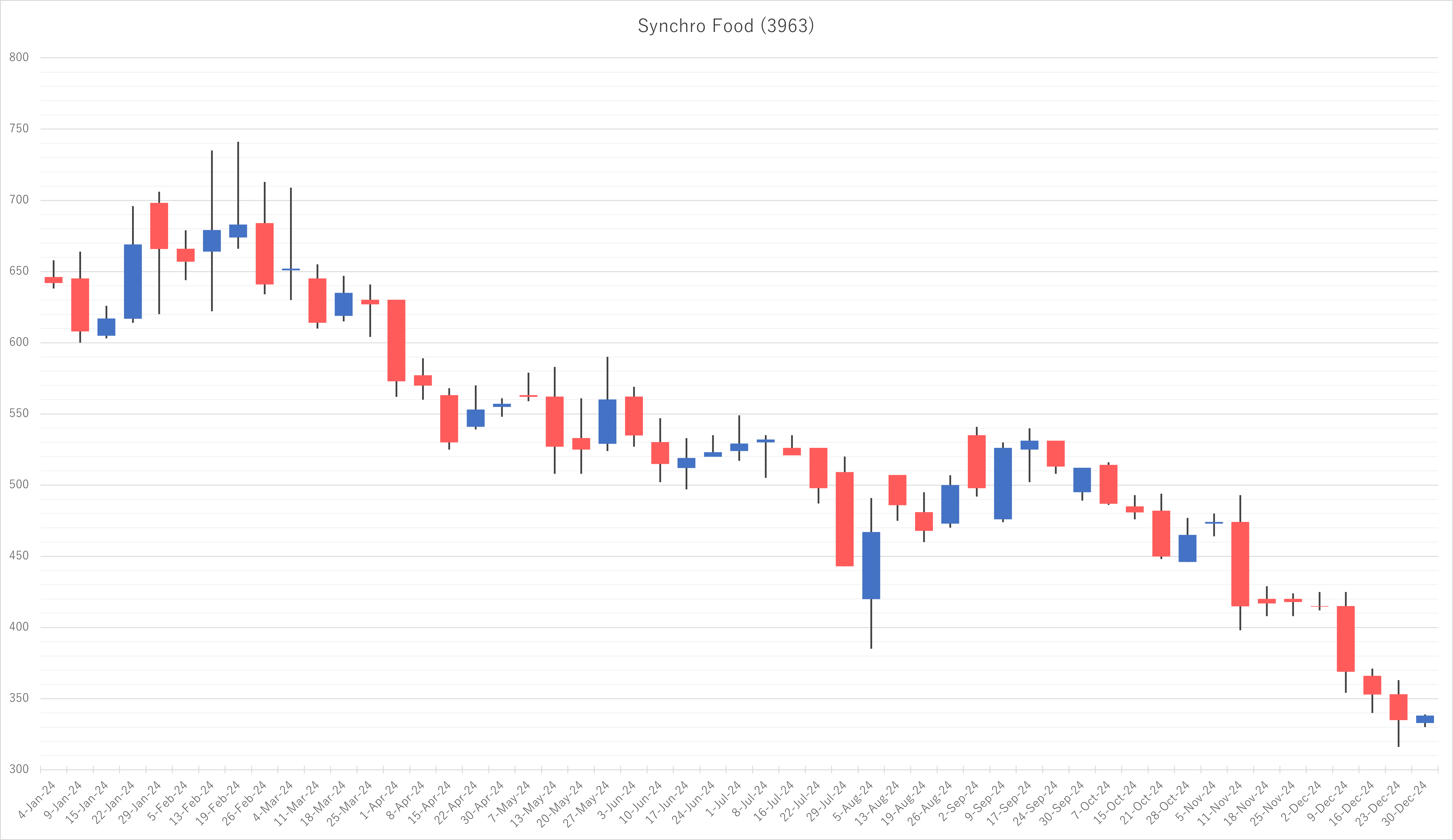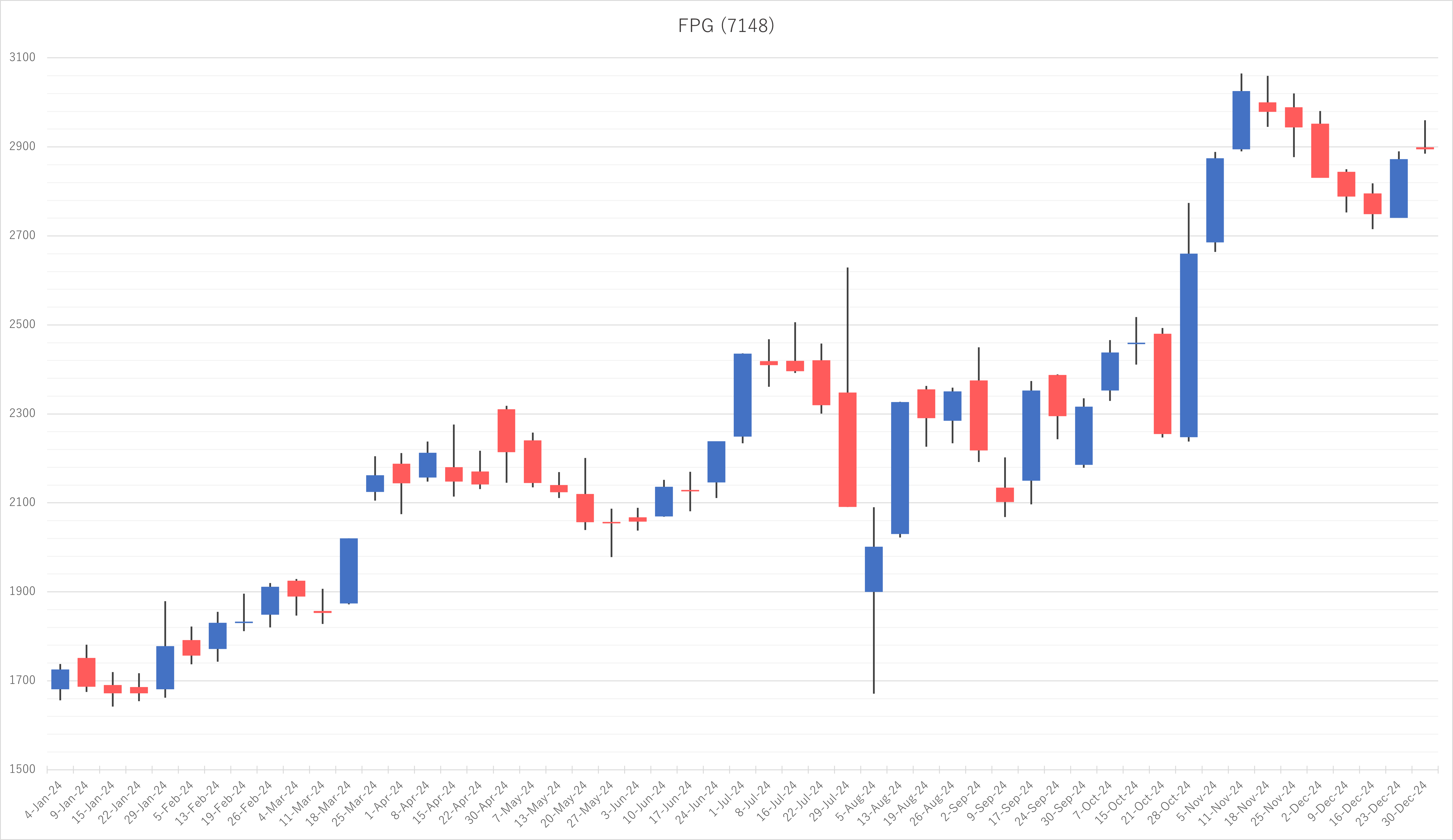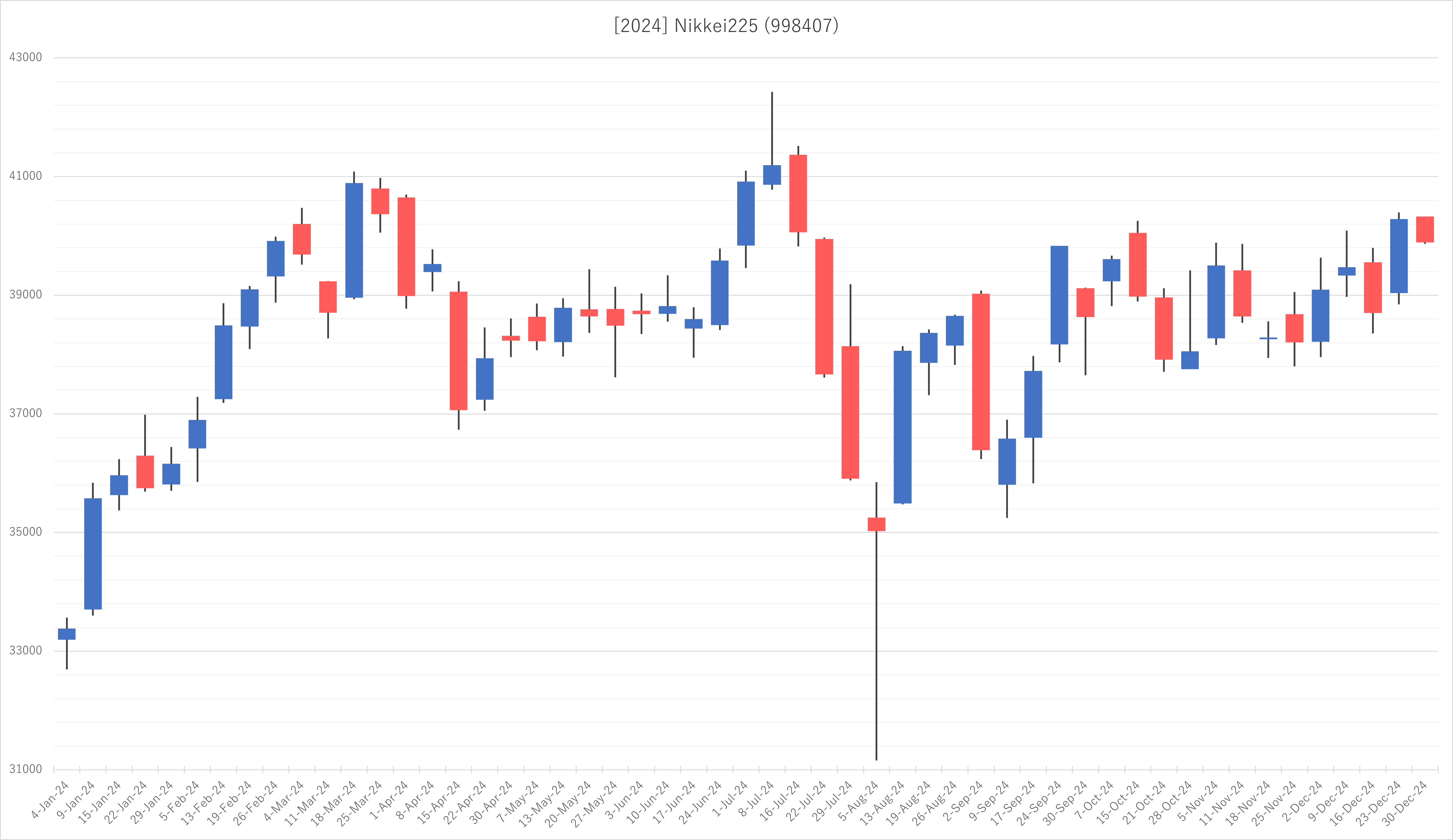![2024 Final Results [Asset Trends Disclosure]](https://financial-textbook.com/wp-content/uploads/2025/01/2024_results.png)
Summary of investment and asset results for 2024.
This article calculates the exchange rate at "$0.00637/yen" (157 yen/$).
The sales and other figures used in this article are current as of the time of writing. The figures may have changed significantly depending on your viewing period.
Table of Contents(目次)
2024 Final Results
The webmaster's stock investment performance for 2024 was +10,287,440 yen (29.06%) compared to the previous year. My assets ultimately came to 45.6M yen($291.0K).

Two separate stocks with contrasting fortunes
Looking at the performance of individual stocks in 2024, there was a clear difference between Synchro Food and FPG, which rose significantly last year.
Synchro Food
Synchro Food's share price continued to fall from January. 2023 the share price rose significantly from 427 to 650, but in 2024, it started at 646 and ended at 338. In other words, the share price fell below the starting line of 2023.
Were Synchro Food's results poor? No, they were not. Net income for FY2024 was +12.2%. The forecast for net income in FY2025 was announced as +25%. Furthermore, the interim results announced on November 14th were +22.5%, so I think the performance level is not bad.
Why did the share price fall? The main reason is probably a lack of dialogue with shareholders. Despite the company's solid performance, the share price fell because of a perception that the company was not proactive about returning profits to shareholders. Synchro Food plans to expand its business through M&A, and the president has announced it.
However, the webmaster suspects many shareholders may have sold their shares due to concerns that the company would accumulate cash for M&A and not pay sufficient dividends. (In the FY2025 earnings forecast, it was announced that dividends were undecided.)
Incidentally, regarding the relationship between business performance and PER, I thought the level of just over 20 times at the beginning of the year was appropriate. Now that the share price has fallen, it has dropped to 10.4 times, but I think it is cheap in terms of the relationship with performance. However, if there is no change in the company's attitude towards dialogue with shareholders, it will be difficult for the share price to recover.
The webmaster made some adjustments to the position of Synchro Food at the end of the year. It still holds the second-largest proportion of the webmaster's portfolio, but its position may change further depending on future trends.

FPG
FPG, which provides financial products for wealthy individuals, has been performing well, and its share price has risen in line with its business performance. Originally, FPG's share price was low compared to its business performance (PER was around 10-12 times), so when its business performance improved, its share price rose naturally.
FPG offers products with tax-saving effects and small-lot real estate sales to wealthy individuals, such as executives of small and medium-sized companies. The number of these products in stock is increasing yearly, and sales are also strong, so the company has achieved record profits. Because of the strong performance, the company's borrowing from financial institutions has also increased to tens of billions of yen, and the frequency of purchasing high-quality real estate has increased. And sales of products that break down these properties into smaller units are also strong.
The company is also forecasting record profits for the current term, so further increases in the share price can be expected.

Comparison with the Nikkei 225
The Nikkei 225's performance in 2024 was +6,430 yen (+19%).
The webmaster's performance was 29.06%, so the price of the stock I own, Synchro Food, dropped significantly, but the price of the other stocks I own rose, and overall I greatly outperformed the Nikkei 225.

Time series of year-over-year changes in assets
This is my table of asset management performance to date.
| End of | Assets (Yen / Dollar) | Change (%) / History |
|---|---|---|
| 2011 | 0yen / $0 | |
| 2012 | 1.15M yen / $8.2K | Initially, I had little money and little profit from my investments, so I saved what I could and used that to purchase shares. |
| 2013 | 2.64M yen / $18.8K | +130% |
| 2014 | 3.67M yen / $26.2K | +39% |
| 2015 | 6.55M yen / $46.7K | +78% |
| 2016 | 10.91M yen / $77.9K | +66% |
| 2017 | 27.68M yen / $197.7K | +153% |
| 2018 | 15M yen / $107.1K | -45% |
| 2019 | 17M yen / $121.4K | +13% |
| 2020 | 19M yen / $135.7K | +11% Stock market decline due to COVID-19. The restaurant and airline industries, which are related to my holdings, were hit. Sluggishness continues through 2023. |
| 2021 | 18M yen / $128.5K | -5% |
| 2022 | 18M yen / $128.5K | +0% |
| 2023 | 35.4M yen / $252.8K | +96% Japan's economy had been in the doldrums due to COVID-19, but with the May revision, things have returned to their normal routine. The price of the stocks I had purchased in 2020-2022 will rise significantly, with the value of my assets rising a whopping +96.7%. |
| 2024 | 45.6M yen / $291.0K | 29.06% |
Compounding Yields/ Since 2012
The table below shows the compounded yields on asset growth since 2012. This includes the impact of deposits (stock purchases) from my payroll. So, especially when my assets are small, the yield appears large due to the impact of the deposit amount.
| End of | Assets (Yen / Dollar) | Compounding Yields Since 2012 |
|---|---|---|
| 2011 | 0yen / $0 | - |
| 2012 | 1.15M yen / $8.2K | - Compounding from 2012, the yield looks large because of the large impact of the deposits from my paycheck. |
| 2013 | 2.64M yen / $18.8K | +130% |
| 2014 | 3.67M yen / $26.2K | +78% |
| 2015 | 6.55M yen / $46.7K | +78% |
| 2016 | 10.91M yen / $77.9K | +75% |
| 2017 | 27.68M yen / $197.7K | +89% |
| 2018 | 15M yen / $107.1K | +53% |
| 2019 | 17M yen / $121.4K | +47% |
| 2020 | 19M yen / $135.7K | +42% |
| 2021 | 18M yen / $128.5K | +36% |
| 2022 | 18M yen / $128.5K | +32% |
| 2023 | 35.4M yen / $252.8K | +36% |
| 2024 | 45.6M yen / $291.0K | +36% |
Compounding Yields/ Since 2016
Once assets exceed 10 million yen (about $63,700), the impact of stock prices is greater than the impact of deposits. For this reason, I have tabulated the results of the compounded yield since the end of 2016, when my assets first exceeded 10 million yen.
At the end of 2024, the yield is +19%. This is not pure stock performance, as it includes deposits from my salary, but it may be considered a good result.
| End of | Assets (Yen / Dollar) | Compounding Yields Since 2016 |
|---|---|---|
| 2016 | 10.91M yen / $77.9K | - When assets exceed 10 million yen ($71,000), the impact of stock prices is greater than the impact of deposits. |
| 2017 | 27.68M yen / $197.7K | +153% |
| 2018 | 15M yen / $107.1K | +17% |
| 2019 | 17M yen / $121.4K | +16% |
| 2020 | 19M yen / $135.7K | +15% |
| 2021 | 18M yen / $128.5K | +10% |
| 2022 | 18M yen / $128.5K | +8% |
| 2023 | 35.4M yen / $252.8K | +18% |
| 2024 | 45.6M yen / $291.0K | +19% |
Finally
I am happy that the performance of my stocks in 2024 was satisfactory. I think that the performance of many stocks will continue to grow steadily. I also believe that the US economy will improve further due to the reforms of the Trump administration.
Whether it's Japanese stocks or indices like the S&P 500, I don't know how stock prices will move in 2025, but if you buy high-quality stocks and indices and hold on to them patiently, you will be more prosperous.
In 2025, I will continue to make long-term investments without worrying about fluctuations in stock prices.
The information on this website is not intended as a solicitation to invest or as investment advice. It is not intended to suggest or guarantee future trends in stock value, nor is it a recommendation to buy or sell. Investment decisions should be made at the user's discretion. While every effort has been made to ensure the accuracy of the information contained in this website, the website administrator assumes no responsibility for any errors in the information, problems caused by downloading data, or any other losses incurred as a result of trading in stocks or other securities.
![2023 Final Results [Asset Trends Disclosure]](https://financial-textbook.com/wp-content/uploads/2023/12/eyecatch_028-150x150.webp)